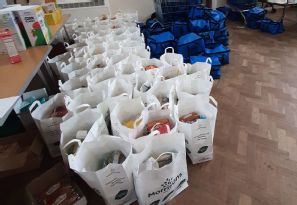News
See below for the latest news from the Warwick Crop Centre.
For our latest publications see Crop Centre in Print
Spotlight on how we're helping people access food through COVID-19
 Doing the weekly shop, or putting in your regular online delivery order, was something most of us took for granted until the COVID-19 crisis hit. Since the social distancing ‘lockdown’, something as basic as going shopping, or popping to the chemist to pick up a prescription, has become increasingly difficult to navigate for vulnerable and elderly people, as well as those who have found themselves in financial difficulty due to a reduced income.
Doing the weekly shop, or putting in your regular online delivery order, was something most of us took for granted until the COVID-19 crisis hit. Since the social distancing ‘lockdown’, something as basic as going shopping, or popping to the chemist to pick up a prescription, has become increasingly difficult to navigate for vulnerable and elderly people, as well as those who have found themselves in financial difficulty due to a reduced income.
Thankfully, dozens of community support initiatives have quickly sprung into action to support these groups, and many of our students and staff have been getting involved to help get food and assistance out to where it’s most needed.
